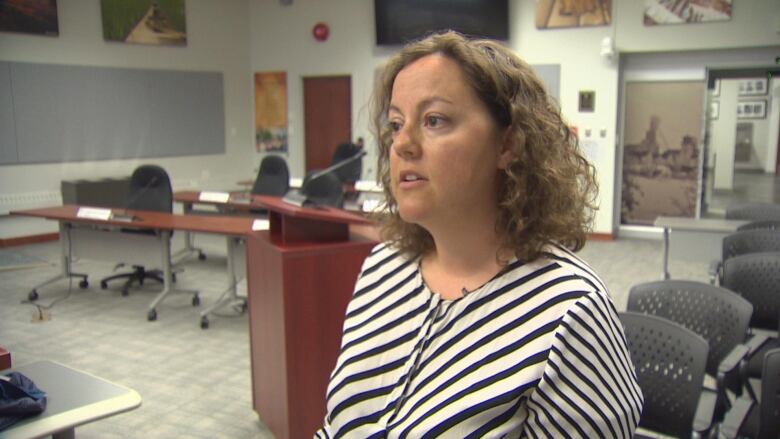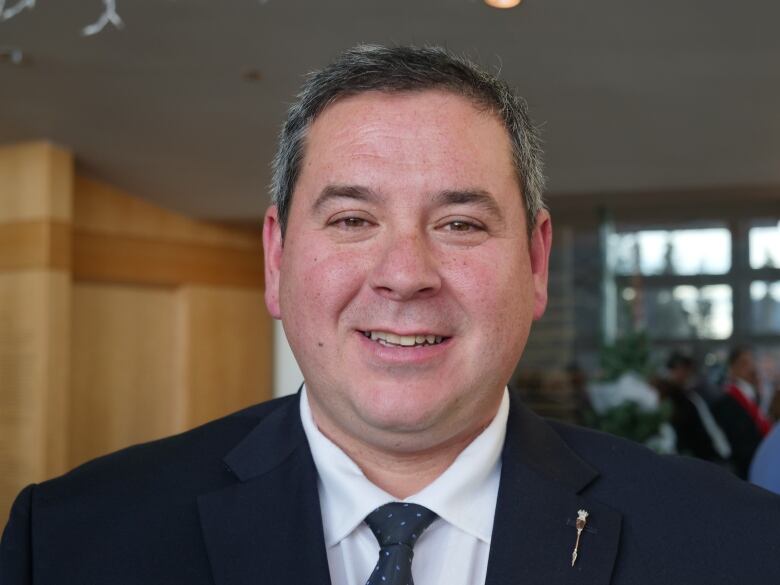N.W.T. government officials, Yellowknife mayor respond to evacuation re-entry emails
Minister says Emergency Management Act wont be updated until after review of 2023 wildfire handling

Yellowknife's mayor says the city has had meetings with the territorial government around emergency preparedness in the event of future wildfire evacuations, but more discussions are still needed.
CBC News spoke with Rebecca Alty, Yellowknife's mayor;Vince McKay, the minister of Municipal and Community Affairs (MACA);and Jay Boast,an information officer with the N.W.T. emergency management organizationabout an access to information request that showed confusion around who was responsible for Yellowknife's re-entry last summer.
The emailsshowed frustration between officials of each level of government towardone another.
During Yellowknife's evacuation, a city official wrote that there was "a lot of miscommunication" happening.
After being asked to send details on the process of re-entry to the city, an N.W.T. official wrote:
"Agree to put it in writing unreal we have to do that, but that's where we are at with these folks."

In response to this and other comments, Alty said she can appreciate that the re-entry process after the city's evacuation was a "stressful" and "frustrating" time.
The territory says it is having ongoing meetings with communities to ensure communication is improved and that lessons learned from last year are being implemented.
'It was an extraordinary step'
According to territorial legislation, the responsibility is on the municipality or local authority to order an evacuation, but the order would be based on evidence from experts with the government and other responding agencies.
"The same would be true for determining when to lift the evacuation order," Boast said.
But in this case, it was the territorial emergency management organization that issued the order, Boast said.That organizationis a committee typically led by an incident commander or the director of emergency response, and includes representatives from different government departments and emergency response personnel like RCMP.
Boast said this was allowed because the MACA minister at the time, Shane Thompson, declared a territorial state of emergency.
"It was an extraordinary step because it would normally be the local authority that would declare the evacuation order," he said.

Boast saidthe situation was unique because of the number of communities being threatened by fires at that time.
When the time came for re-entry, Boast said the minister revoked the territorial state of emergency, which means the municipality, or local authority, is in charge of re-entry.
He said this was eventually clarified with the city, who did then lift the order.
Emergency Management Act
Alty said the territory declaring the state of emergency caused a bit of confusion, and there are still some questions.
Under the Emergency Management Act, Yellowknife has the same legal authority as all the other communities under an emergency. This was something flagged by Shauna Morgan, MLA for Yellowknife North, months ago.
Alty said she wants to see a discussion about recognizing Yellowknife is different from other communities.
"The fact that we have some of the territorial facilities here, half of the population here, should we have different legal authorities?" she said.
"That one's discussion to come."

In the event of another evacuation, the rules and responsibilities remain largely the same.
The emergency management planwas updated by the territorial government, which aimed to provide more clarity before the wildfire and flood season. It clarifiedthe role of Indigenous governments who are the local authorities in their region, and those who aren't.
But in order to be changed thoroughly, the Emergency Management Act territorial legislation would need to be updated.
Vince McKay, MACAminister, said his department is waiting to complete its own review of the 2023 wildfire season before changing the act.
"It wouldn't be very useful to go make changes to the act and then realize we needed to make more changes again. Obviously it takes a little bit to do this stuff," he said.
McKay says he's assuming lessons learned will be implemented into the act after the review, but he credited the department on its ongoing communication with other communities on emergency management in the meantime.












_(720p).jpg)


 OFFICIAL HD MUSIC VIDEO.jpg)
.jpg)



























































































